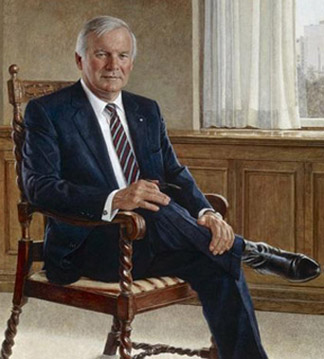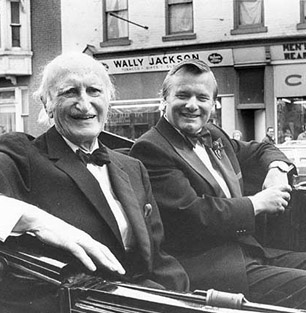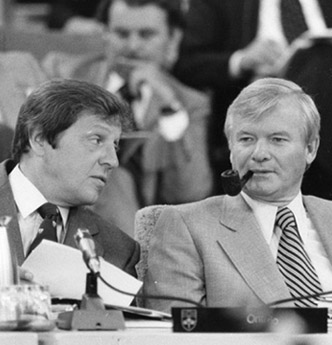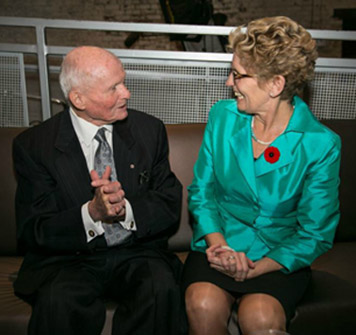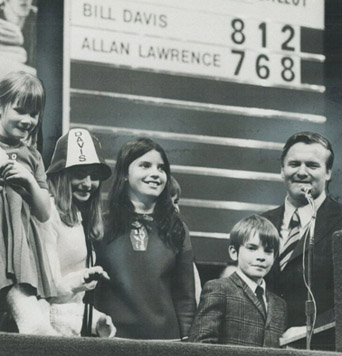RIP William Grenville Davis – we’d have better democratic politics in Ontario today if we had more politicians like him
Aug 9th, 2021 | By Randall White | Category: In BriefONTARIO NOTEBOOK – RANDALL WHITE, FERNWOOD PARK, TORONTO. AUGUST 9, 2021. Like so many others I was saddened to hear that the 18th premier of Ontario – bland Bill Davis from Brampton – died peacefully at his home yesterday morning, with his family by his side, some nine days after celebrating his 92nd birthday.
There are, just as examples, three good obituaries that nicely survey Mr. Davis’s life and times in the oldest newspapers of the Ontario capital city : a piece by Jim Coyle in the Toronto Star ; one by Sandra Martin in the Globe and Mail ; and an anonymous report from the Canadian Press in the Toronto Sun. I only want to offer a few hasty personal notes, ultimately from the vantage point of someone who has at least voted in every Ontario election since 1967.
I was a young and obscure ordinary worker in the Ontario public service when William Davis, MPP became leader of the Ontario Progressive Conservative party in February 1971. His party had a majority of seats in the Legislative Assembly. So on March 1, 1971 he became premier of the vast Canadian province north of the Great Lakes, south of Hudson Bay, west of the Ottawa River, and east of the Lake of the Woods. And through happenstance unrelated to my history as a democratic voter (past, present, or future) I was present for a time at the old Maple Leaf Gardens PC convention that finally elected Davis party leader on the fourth ballot.
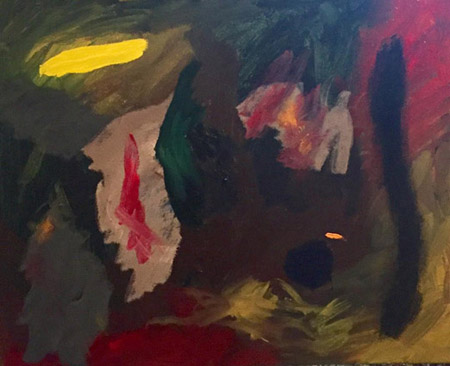
I worked for two different Ontario ministries (formerly departments) during Bill Davis’s long tenure as head of government. (In the end he served for 13 years and 344 days : the second-longest Ontario premier’s career after the 23 years and 270 days of grand old man Oliver Mowat in the later 19th century.) I never actually acquired any face-to-face acquaintance with Premier Davis. But at the height of my time at the front I did write one or two bureaucratic policy-wonk speeches for him, that I was told were well enough received. In any case as my experience working for the government he presided over deepened, my understanding, respect, and finally admiration for his leadership grew like a tree.
Back in the present day I found Jim Coyle’s Toronto Star obituary the one with the most of the kind of thing I came to admire most in Premier Davis, when I worked in the Ontario public service. Presuming upon Mr. Coyle’s indulgence in what technically amounts to blatant theft, some select quotations from his fine work hint broadly at what I mean :
- “Seldom in Canada – perhaps anywhere in the world – has a political leader described his formula for success in such succinct and self-effacing terms as Davis once did … ‘Bland works,’ he told a journalist who inquired why he ran so boring a government.”
- “‘What made Mr. Davis special was his inbred decency,’ his former press secretary Joan Walters told the Star.” (Current Brampton Mayor Patrick Brown also tweeted that Davis was “Ontario’s most successful Premier and the definition of decency.” And Toronto Mayor John Tory has urged that Bill Davis “just radiated decency.” )
- “For Davis, a good day was when his name wasn’t on the front pages.”
- “Yet, through what one opposition leader called ‘government by stealth,’ Davis steered Ontario through the transition from a prim, prosperous, Protestant bastion of the mid-20th century to the emergence of the vibrant, diverse, modern province that exists today.”
- “To some former MPPs and Queen’s Park veterans, the Davis years were the golden age of civility and collegiality in the government of Ontario. Among his greatest admirers are politicians who belong to opposition parties or once considered him a political rival.”
- “Al Dickie, a former press gallery reporter who went to work for a Davis cabinet minister, said ‘I never met a more unflappable politician’ than Davis, but ‘beneath the bland exterior there lurked a competitive personality.’”
- “As former attorney general Roy McMurtry recalled in his recent memoirs, Davis maintained ‘a cautious but forward-looking outlook, and while he believed that government should be progressive, he did not think it should be constantly in people’s faces.’”
- “Rick Haliechuk, a former Star reporter, said Davis perfected the art – smiling his way through oratorical detours, jests, cryptic musings – of using a lot of words to say not much of anything … His decisions would be revealed … ‘in the fullness of time.’ In the meantime, the premier had ‘no plans to have plans.’”
My experience as an obscure ordinary worker in the Ontario public service was that Premier Davis’s approach to the people’s business did somehow spread throughout the vast governing bureaucracy in benign and somehow constructive ways. And there are those who also urge that his impact on the broader provincial community was so constructive and enduring that “in many ways, ‘it’s still Bill Davis’s Ontario’” in the early 21st century.
I do not quite feel this way myself.
I am happy to agree that much of what remains good about Ontario government and politics today is a legacy of any number of good things William Grenville Davis set in motion during his long political career.
But as someone who intermittently began to look into the historical background at greater length, after I left my modest role in the public service, the almost 14-year reign of Premier Davis strikes me as much more of an apogee (or “highest point”) of a long and authentic “Progressive Conservative” regional political tradition. And this had its roots in the Ontario election of 1943 – when the old CCF ancestors of today’s New Democrats came from almost nowhere to almost win the commanding heights at Queen’s Park.
By the end of Davis’s regime in 1985 this 42-year Ontario Red Tory dynasty was crashing on the ideological rocks of much more right-wing conservative philosophies. Some would say the Liberal premiers Dalton McGuinty and Kathleen Wynne were the real successors of William Davis. (And at least from a distance there sometimes seemed moments in his later years when Mr. Davis seemed to think so too.)
My sense is that the “Davis years” certainly were “the golden age of civility and collegiality in the government of Ontario,” and for whatever reasons this age vanished long ago.
The so-called “Ontario PC Party” in 2021 could learn a lot it ought to know from the example of the four majority, minority, minority, and majority governments of Premier Davis, elected in 1971, 1975, 1977, and 1981.
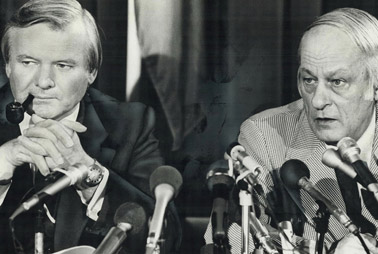
The larger democratic political system (ultimately including all we mere voters too) could aim for at least some new bronze or silver age of civility and collegiality in the government of Ontario – from the kitchen table to the Provincial Parliament Buildings at Queen’s Park..
But none of this seems to me to be happening. At least not yet. Which could be all the more reason for cultivating and keeping the memory of the 18th premier alive and well.
We would have better democratic politics today if we had more politicians like bland Bill Davis from the mythical old small-town Ontario (well Brampton anyway), elected MPP for Peel North and then Brampton from the late 1950s to the mid 1980s – and the apogee or ultimate personification of the long-since-vanished 42-year Progressive Conservative dynasty in Canada’s most populous province, 1971—1985.
For better or worse, Randall White has a PhD in political science from the University of Toronto.
From the late 1960s to the early 1980s he worked as an Ontario public servant.
He subsequently worked as an independent policy consultant for private and public sector clients at all three levels of government in Canada and the United States.
He has written (or co-written) 11 books on Canadian and Ontario history and politics, and is at work on a twelfth.
